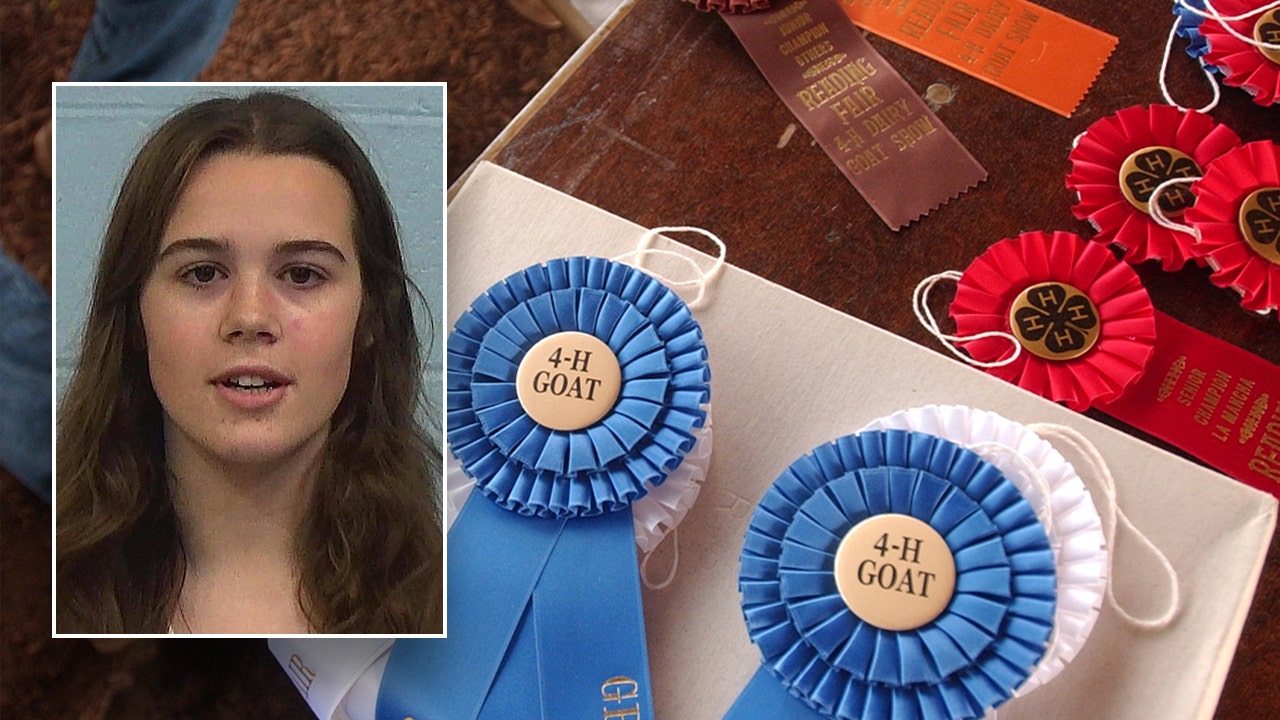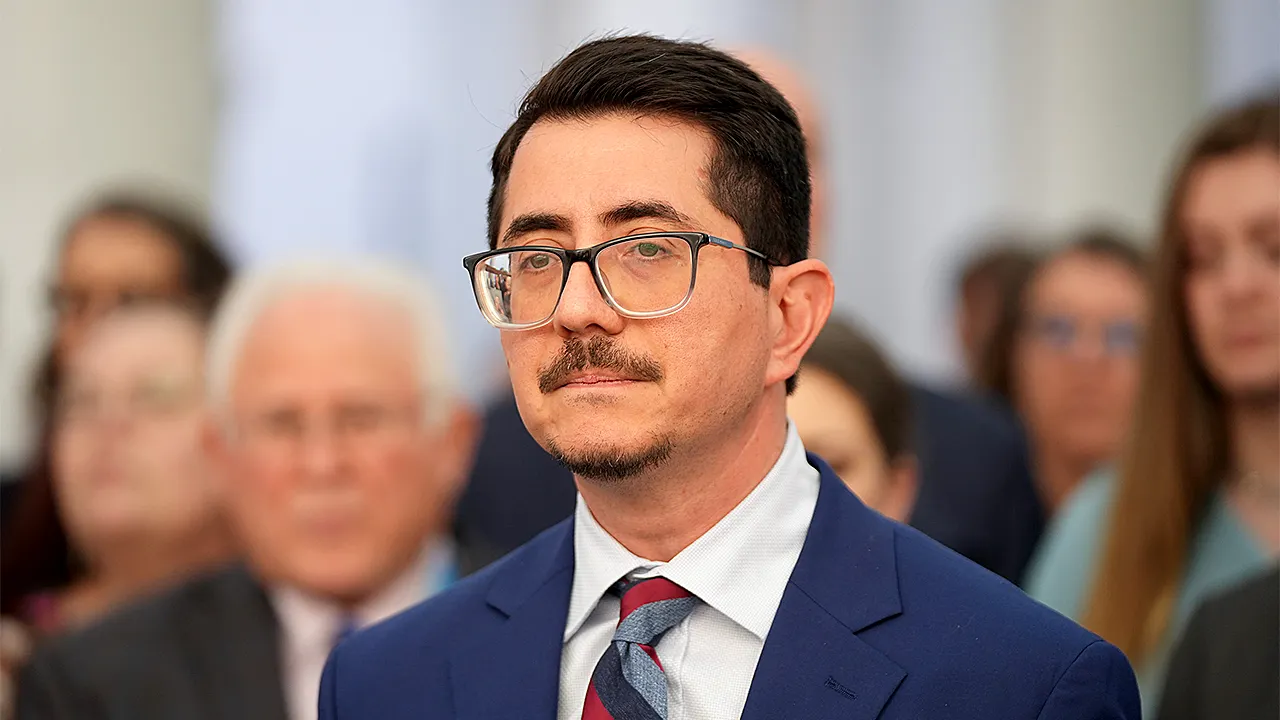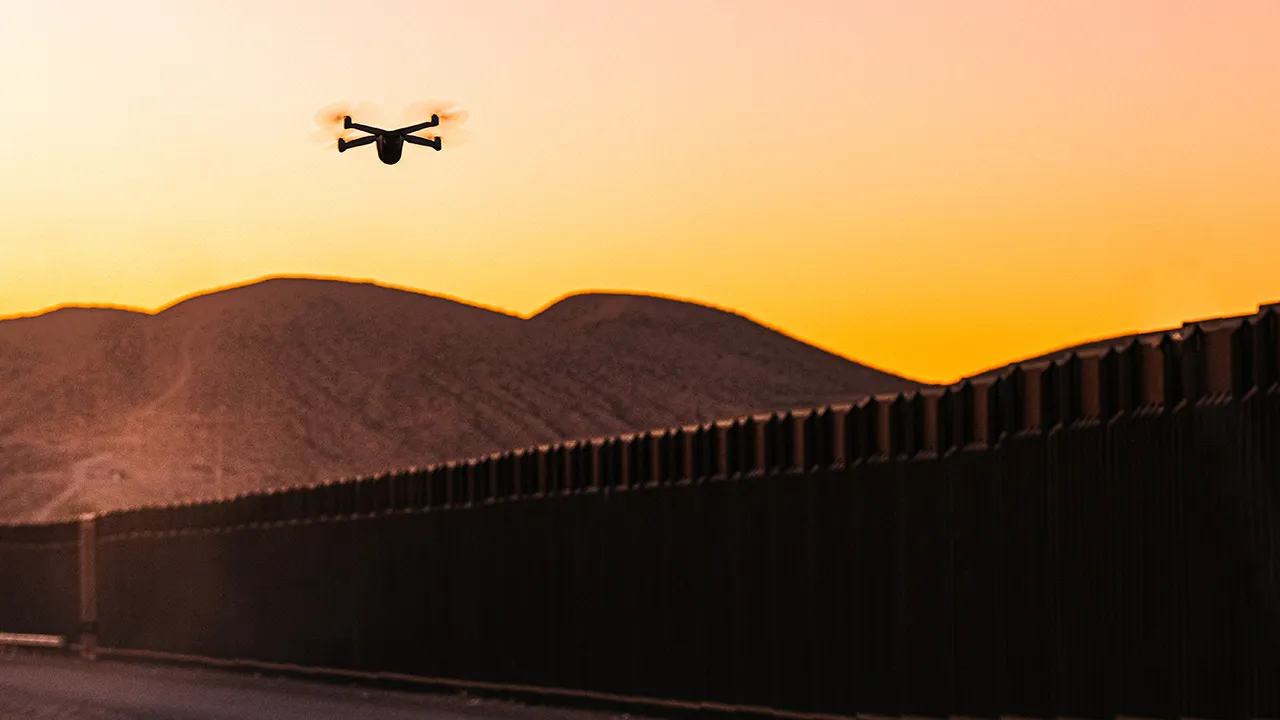Southwest
Texas teen allegedly killed rival competitor's show goat in act of jealousy

A teenager in Texas is facing a felony charge after allegedly killing a rival competitor’s show goat a couple of months ago.
An arrest affidavit showed 17-year-old Aubrey Vanlandingham, who competes in livestock shows with her own goat, allegedly admitted to poisoning Willy, a younger competitor’s goat, CBS Austin reported.
Vanlandingham is accused of using a drench gun to force-feed Willy a toxic pesticide inside the Vista Ridge High School’s barn facility on Oct. 23, ultimately killing the 6-month-old goat, according to the outlet. Security footage allegedly showed the goat trying to escape the encounter.
The teenager was allegedly seen leaving Willy and returning to check on him two separate times during a two-hour period before calling the rival competitor’s mother to tell her the goat wasn’t doing well.
‘UNCOOPERATIVE’ TEXAS TEEN FOUND COVERED IN SOMEONE ELSE’S DRIED BLOOD AFTER CAR WRECK: SHERIFF
Aubrey Vanlandingham, 17, is accused of killing a rival competitor’s show goat by force-feeding it pesticide. (Williamson County Sheriff’s Office)
Willy died in his owner’s arms within 24 hours after experiencing convulsions and respiratory distress, CBS Austin said.
Vanlandingham allegedly admitted to killing her rival’s goat because she thought the 15-year-old was “a cheater,” the outlet reported from the arrest affidavit. She had tried to kill Willy before, but was unsuccessful.
Vanlandingham was also a show competitor with her goat, Lacey. (Ben Hasty/MediaNews Group/Reading Eagle via Getty Images)
Willy’s cause of death was determined to be organophosphate intoxication from phosmet, a pesticide used for external parasite control in livestock.
The mother of the 15-year-old girl told the DailyMail that Vanlandingham doesn’t appear to be remorseful.
“It’s all bizarre. We want justice served, we don’t want a slap on the wrist. We want to make sure that she is punished. At this point, we don’t feel like she thinks she’s going to be punished and she needs to be. She needs to take ownership for what she’s done,” she told the outlet, adding that they want her to go to jail and get mental help.
‘MONSTER’ FLORIDA TEEN KILLS PARENTS, WOUNDS DEPUTY IN SHOOTOUT: POLICE
A police investigation into Vanlandingham’s phone revealed that she allegedly searched for information on lethal doses of bleach for animals and poisoning methods, according to CBS Austin. She also allegedly searched “how to clear search history.”
The 15-year-old’s mother determined Vanlandingham’s alleged crime was fueled by jealousy, not cheating.
“You can’t even cheat when it comes to showing goats,” she told the DailyMail. “It makes no sense, so that’s where the jealousy really kind of falls into place.”
Goats arriving at the Houston Livestock Show and Rodeo in Houston, Texas. (Karen Warren/Houston Chronicle via Getty Images)
Vanlandingham was charged with cruelty to livestock animals, which is a felony in Texas punishable by up to two years in prison. She was arrested on Nov. 22 and released on a $5,000 bond the same day, jail records show.
Her court date is set for Jan. 15.
Read the full article from Here

Southwest
Travis County DA faces renewed ‘soft on crime’ criticism after career criminal charged with murder

NEWYou can now listen to Fox News articles!
A Texas-based career criminal with a lengthy rap sheet is behind bars in Travis County after he was charged with murdering a father of five outside a 7-Eleven in Austin, reviving scrutiny of Travis County District Attorney José Garza and what critics call his controversial prosecutorial record and “soft on crime” approach.
Caleb Anthony Jenkins, described by police as a career criminal, was charged with murder in connection with a shooting last year that left a 25-year-old father dead outside a 7-Eleven. According to Austin police, Jenkins allegedly shot the victim and drove off.
But critics argue the killing may have been preventable. Garza’s office previously dismissed or declined to prosecute three separate gun charges against Jenkins in incidents dating back to 2022. He was also arrested in 2023 on a domestic violence charge and failed to appear in court, as Fox News reported. Most recently, he was re-arrested and released after his bond was raised.
Taken together, the developments have intensified public criticism of Garza, the Democratic district attorney backed by liberal mega-donor George Soros,
District Attorney Jose Garza in Austin, Texas. (Spencer Selvidge for The Washington Post via Getty Images)
Garza, who was elected Travis County DA without prior experience as a prosecutor, has faced criticism from police advocacy groups and victims’ families since taking office. They have accused him of deliberately slow-walking certain cases and embracing lenient sentencing policies.
The criticism has sparked national attention in years past. In 2023, the family of 25-year-old Doug Cantor, who was shot and killed in the 2021 Sixth Street mass shooting in downtown Austin, criticized Garza for slow-walking the trial of the gunman.
Family members told Fox News Digital in an interview at the time that they believed Garza had put the case on the “back burner.”
“It’s very clear that his focus and attention is not on this case,” Nick Kantor told Fox News Digital in an interview reflecting on the two-year anniversary of his brother’s death — and the way Garza, who has been widely criticized for soft-on-crime policies, has handled the case.
AUSTIN DA GARZA CREATES CONFUSION WITH ANNOUNCEMENT OF IMPENDING INDICTMENTS AGAINST MULTIPLE POLICE OFFICERS
Travis County District Attorney Jose Garza poses in front of the Austin skyline in a portrait from the county website. Garza has faced criticism for accusations that he aggressively prosecutes police officers accused of wrongdoing while going easy on career criminals. (Travis County DA Website)
“He’s doing things that are clearly causing distress on the trial and on the overall outcome of the case and for getting justice for my brother,” Kantor said.
Other victims’ families cited similar behavior from Garza’s office in interviews with Fox News Digital.
While overall reported crime in Travis County has declined, opponents argue dismissal rates have been “political,” and could further endanger public safety.
It “appears that Garza has now become more of an advocate for the criminal than he has for the victim,” Dennis Farris, president of the Austin Police Retired Officer’s Association, previously told Fox News Digital.
“The prosecution is acting more like defense attorneys than they are prosecutors,” Farris said in an interview roughly one year after Garza took office. “Whatever his skewed view of what criminal justice reform is, it isn’t working. It sure isn’t working for the victims.”
CRIME EXPERTS RESPOND TO SOROS DEFENDING SUPPORT FOR PROGRESSIVE DAS AMID CRIME WAVE: ‘DISASTROUS’
George Soros delivers a speech at the 2022 World Economic Forum in Davos. (Fabrice Coffrini/AFP via Getty Images)
“It used to be that they got the victims’ buy-in before offering plea bargains. Now it doesn’t appear he’s even doing that, because they’re not even communicating with them, and that’s what’s leading to the revictimization of these families.”
Current and former local law enforcement officers have criticized Garza’s actions and his alleged “war on cops,” after the Soros-backed district attorney campaigned on indicting police officers and “reimagining” policing in Austin.
Soros contributed $652,000 to the Texas Justice & Public Safety PAC in the months leading up to the 2020 Travis County DA election, according to campaign finance records.
That same PAC spent almost $1 million on digital and mail advertisements to help Garza’s campaign, as Fox News reported.
The Travis County District Attorney’s Office did not respond to Fox News Digital’s request for comment.
Read the full article from Here
Southwest
Jasmine Crockett campaign reportedly kicked Atlantic writer out of rally for being a ‘top-notch hater’

NEWYou can now listen to Fox News articles!
Atlantic staff writer Elaine Godfrey reported that she was “thrown out” of a rally for Rep. Jasmine Crockett, D-Texas, for being a “top-notch hater” according to Crockett’s team.
“Right before armed guards escorted me from the rally and left me on the edge of a Texas-county road, I was informed that I was no longer welcome at an event that I had already attended,” Godfrey wrote on Thursday.
She described having spent an hour at the Lubbock rally for Crockett’s Senate campaign before being approached by a woman with a badge as soon as she joined other reporters.
Elaine Godfrey claimed Rep. Jasmine Crockett’s team removed her from a rally in Texas earlier this week. (Dustin Franz/Bloomberg via Getty Images)
“‘Are you Elaine?’ she asked. I recognized her from the entrance of the event, where I had identified myself as she’d waved me into the building’s press area. Yes, I answered. ‘Her team has asked you to leave,’ she said. When I asked why, the staffer looked at her phone and read dutifully: ‘They just said, “Elaine from Atlantic, White girl with a hat and notepad. She’s interviewing people in the crowd. She’s a top-notch hater and will spin. She needs to leave,”’” Godfrey wrote.
Godfrey was the staff writer behind a profile piece for Crockett in July that reportedly received backlash from the Texas representative after including comments from fellow House Democrats “without telling her first.”
“She was, she told me, ‘shutting down the profile and revoking all permissions,’” Godfrey wrote at the time.
BOEBERT JOKES ABOUT ENDORSING CROCKETT IN TEXAS’ SENATE RACE TO GIVE HER DEMOCRATIC RIVAL A BOOST
Rep. Jasmine Crockett, D-Texas, is running in the Democratic primary for U.S. Senate. (LM Otero/AP Photo)
The piece was still published and included comments from other Democratic figures.
According to Godfrey, Crockett said that there was “no evidence” that a reporter was removed from her rally but claimed that there was a “specific journalist” who has a “history of being less than truthful” and had previously lost a lawsuit against Crockett.
“Perhaps she was thinking of someone else, because that’s not something that has ever happened to me,” Godfrey wrote.
CROCKETT DISPUTES OPPONENT’S DENIAL OF ‘MEDIOCRE BLACK MAN’ COMMENT, CALLS OUT ‘WELL-INTENTIONED WHITE FOLK’
Godfrey added that her removal from the rally wasn’t a surprise considering Crockett’s firebrand-style of politics, though she expressed concern over how she was handled.
Rep. Jasmine Crockett allegedly tried to shut down an article from Elaine Godfrey after she spoke to other House Democrats. (Bob Daemmrich/The Texas Tribune/Bloomberg via Getty Images)
“As security guards began to materialize around me, I wondered to myself what distinguished a top-notch hater from a middling one. I agreed to leave, and four guards, including at least one who was armed, escorted me out of the building, through the parking lot, and right to the edge of the nearby highway, where they waited as I ordered a car,” Godfrey wrote.
CLICK HERE TO DOWNLOAD THE FOX NEWS APP
Fox News Digital reached out to Crockett’s office and campaign for comment.
Read the full article from Here
Southwest
FAA restricts Texas airspace after Pentagon reportedly strikes down Customs and Border Protection drone

NEWYou can now listen to Fox News articles!
The Federal Aviation Administration (FAA) restricted flights Thursday near Fort Hancock, Texas, after a U.S. Customs and Border Protection (CBP) drone was reportedly shot down by a laser sytem operated by the Pentagon.
While government agencies have not identified who the drone belonged to, top Democrats on the Transportation and Infrastructure Committee released a joint statement Thursday evening claiming the drone belonged to CBP.
U.S. Reps. Rick Larsen, Bennie Thompson and Andre Carson said their “heads are exploding over the news” that a CBP drone was shot down by the Pentagon with “a high risk counter-unmanned aircraft system.”
The legislators added that this incident is “the result of [the White House’s] incompetence” after a “short-sighted” decision to “sidestep a bipartisan, tri-committee bill to appropriately train C-UAS operators and address the lack of coordination between the Pentagon, DHS and the FAA.”
The FAA expanded a temporary flight restriction near Fort Hancock, Texas, after lawmakers said a Pentagon-operated counter-drone system may have shot down a U.S. government drone. (iStock)
In a joint statement provided to Fox News Digital, the Department of War, CBP and the FAA said the DOW used counter-unmanned aircraft system to respond to a “seemingly threatening unmanned aerial system operating within military airspace.”
The departments said the engagement took place “far away from populated areas and there were no commercial aircraft in the vicinity,” adding they “will continue to work on increased cooperation and communication to prevent such incidents in the future.”
The departments said they are “working together in an unprecedented fashion to mitigate drone threats by Mexican cartels and foreign terrorist organizations at the U.S.-Mexico border.”
“The bottom line is the Trump Administration is doing more to secure the border and crack down on cartels than any administration in history,” the statement added.
FBI RAMPS UP COUNTER-DRONE EFFORTS AS PATEL WARNS OF GROWING THREATS FROM CRIMINALS, TERRORISTS
Congressional aides told Reuters that the Pentagon reportedly used the high-energy laser system to accidentally shoot down the CBP drone near the Mexican border, an area that frequently sees incursions from drones believed to be operated by Mexican drug cartels.
The FAA told Fox News Digital that a temporary flight restriction (TFR) was “already in place” around the Fort Hancock area and that the TFR “has been expanded to include a greater radius to ensure safety.”
The restriction does not impact commercial flights, the agency said.
The FAA said in a Notice to Air Missions (NOTAM) that airspace around Fort Hancock was temporarily restricted for “special security reasons.”
CLICK HERE TO DOWNLOAD THE FOX NEWS APP
The restriction comes a couple of weeks after the FAA grounded flights to and from El Paso International Airport for 10 days before lifting the order roughly eight hours later.
Drones operated by Mexican drug cartels breached American airspace earlier this month near El Paso International Airport in Texas, leading the FAA to temporarily close the airport. (Kirby Lee/Getty Images)
A Trump administration official previously told Fox News that the initial lockdown came in response to “Mexican cartel drones” that breached U.S. airspace.
A U.S. official later confirmed that the U.S. military had shot down what was later determined to be a party balloon near El Paso.
Fox News Digital reached out to the White House for comment and was directed to the joint statement provided by the Department of War, Customs and Border Patrol and Federal Aviation Administration.
Fox News Digital’s Anders Hagstrom and Reuters contributed to this report.
Read the full article from Here
-

 World6 days ago
World6 days agoExclusive: DeepSeek withholds latest AI model from US chipmakers including Nvidia, sources say
-

 Massachusetts6 days ago
Massachusetts6 days agoMother and daughter injured in Taunton house explosion
-

 Denver, CO6 days ago
Denver, CO6 days ago10 acres charred, 5 injured in Thornton grass fire, evacuation orders lifted
-

 Louisiana1 week ago
Louisiana1 week agoWildfire near Gum Swamp Road in Livingston Parish now under control; more than 200 acres burned
-

 Oregon4 days ago
Oregon4 days ago2026 OSAA Oregon Wrestling State Championship Results And Brackets – FloWrestling
-

 Florida2 days ago
Florida2 days agoFlorida man rescued after being stuck in shoulder-deep mud for days
-

 Technology1 week ago
Technology1 week agoArturia’s FX Collection 6 adds two new effects and a $99 intro version
-

 News1 week ago
News1 week agoVideo: How Lunar New Year Traditions Take Root Across America













